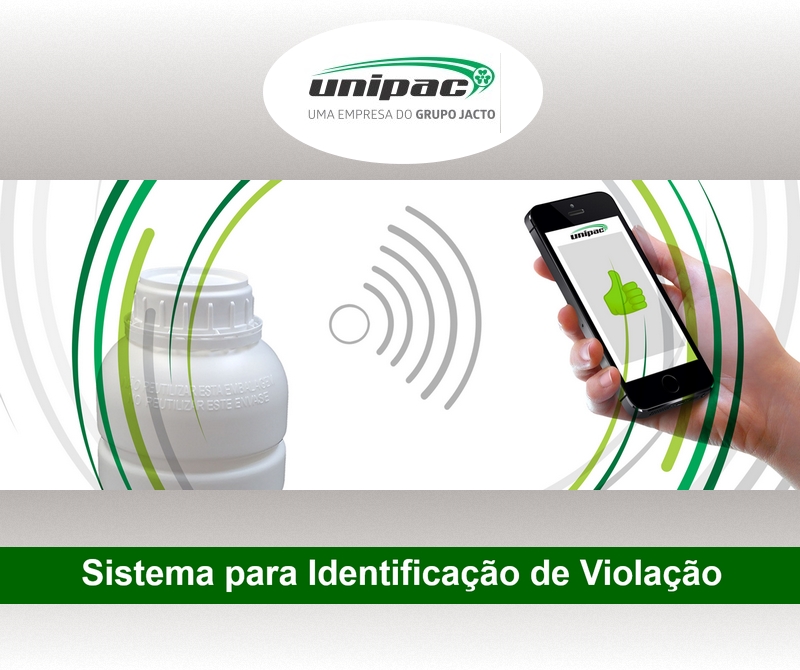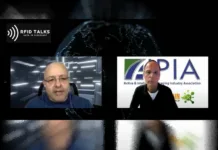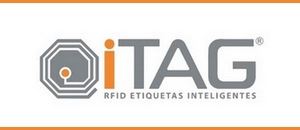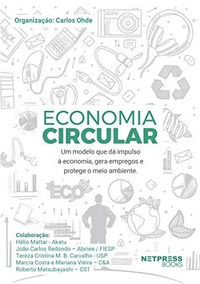Edson Perin
Unipac announces the adoption of an Internet of Packaging (IoP) solution with radio frequency identification (RFID), to guarantee the security and authenticity of its products. The company is one of the business units of the Brazilian Grupo Jacto, with more than 70 years and is composed of important companies that operate in the agricultural, polymer application technology (automotive, packaging and logistics), transportation, equipment for cleaning services segments and hygiene, and solutions for the medical field.
The system consists of an induction seal and a smartphone application with NFC reader (Near Field Communication), a type of RFID. The seal is mounted on the lids of the products, just as with conventional authenticity seals.
André Silvestre, sales manager of the packaging segment at Unipac, adds that, during the packaging lifecycle at the company until it is opened by the end user, anyone with a smartphone that has an NFC reader and has downloaded the Unipac application can verify whether the packaging has been tampered with. “After opening the packaging, the system allows for the identification that it has been violated and, therefore, is potentially non-authentic, in addition to providing real-time information and passive traceability.”
Humberto Fujita, a researcher at Unipac, explains that Unipac has developed a solution for the plastic packaging market that is different from those that existed until now. “We offer a response to customers who want to solve the violation problem using technologies applied directly to the product.”

Two points were challenging for Unipac: the uncertainty about the breadth of NFC technology in Brazil, in 2014, when the project was started, and the learning in the construction of these prototypes until having an MVP (minimum viable product) to be industrialized. “Over time, the tags in the UHF and NFC technologies were tested and, based on the analysis of their advantages, the NFC tag was chosen due to the growth of this technology and the availability of these readers on smartphones, allowing the common user access to the means to authenticate the product, without having to invest in specific equipment”, said Fujita.
Patented, the current configuration provides for coupling the NFC tag to the induction seal (aluminum), forming a single piece. The solution meets the homologation requirements and will replace the conventional seal without the need for changes to the lid or packaging, which will enable customers to adopt the technology. In addition, it will not affect the potential to be recycled.
One of the benefits obtained with the system, in Silvestre’s opinion, was reliability, since the system makes it difficult to reuse authentic packaging, as it allows to identify any violation. “In this way, the practice of counterfeiters to fill non-authentic pesticides in empty – and authentic – discarded packaging is apparent when verifying the tag’s identifier in the database,” says Silvestre.
The system allows a more objective decision based on the NFC reader of a cell phone, through the authentication of the tag identifier with a database in the cloud. “The use of NFC technology is growing on smartphones, enabling authentication in a practical way and allowing access to a greater number of users”, he added. Interactivity was also seen as one of the gains, since the reading data enables greater interaction between the consumer and the industry, which allows to know the consumption habits of customers and end users.
“Furthermore,” says Silvestre, “loyalty programs, awards, unit recalls are possible and the possibility of these packages interacting with the machines that will make the application in the field, for traceability from the chemical industry to the farm”.
According to Fujita, Unipac has already mapped opportunities for the future, at first, for use in the pesticide market, which demands this type of solution, as according to the June 2019 report of the Institute of Economic and Social Development of Borders (IDESF), about 20% of the pesticides sold in Brazil are of illegal origin, at an annual cost of R $ 8.8 billion (about U $ 2.1 billion). “Unipac has proof of concept (PoC) in progress in the pesticide market, in addition to prospecting initiatives in other potential markets,” he informed.
With the solution, from the filling of the product, anyone, anywhere in the chain, can authenticate the packaging, downloading the application and registering in the Unipac system. “For consumers looking for quality and original products, the main value will be the verification of authenticity. For Unipac customers who will use these resources, it will be possible to obtain information on the product’s life cycle, traceability, batch deviation, sales in different regions than planned, in addition to information regarding the end user’s consumption patterns ”, celebrates Wild.
Founded in 1976, Unipac has become a reference for national and international companies operating in the automotive, pesticide, logistics and other segments. It has units in Pompeia (headquarters) and Limeira (branch), both in São Paulo, and on its clients’ websites, using the in house model, in the cities of Regente Feijó (SP), Paulínia (SP) and Maracanaú (CE) .



















